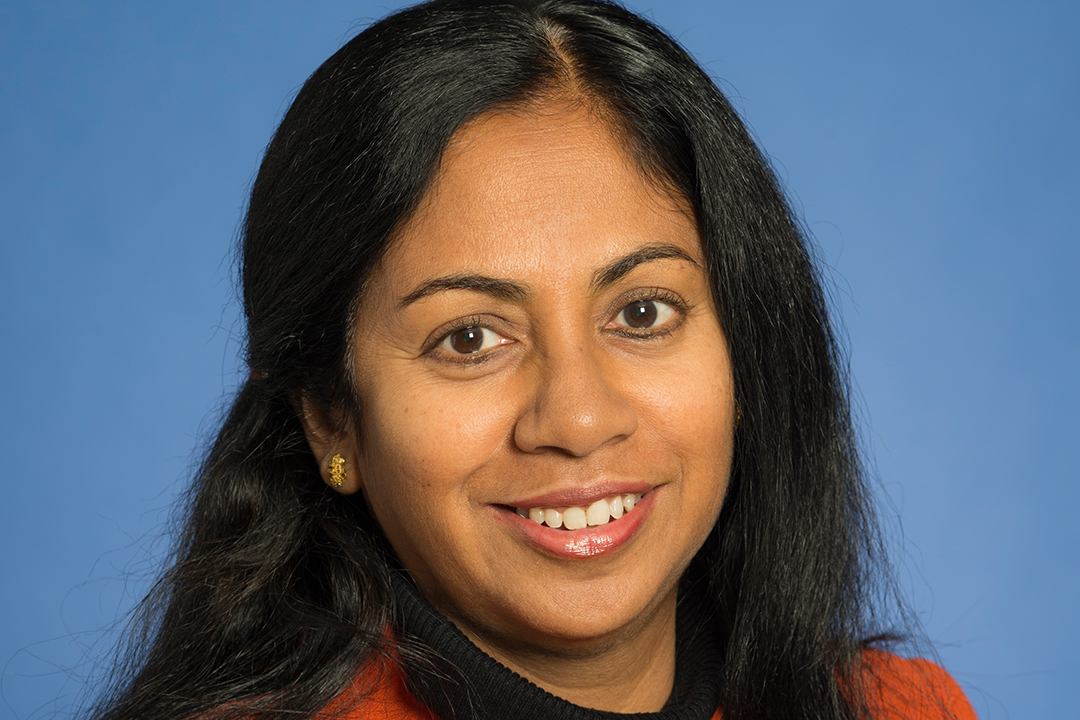Geography Professor and Department Chair Elizabeth Chacko has always seen her professional career as an academic adventure—a chance to ask a new question, uncover a new insight and spark new excitement in a student’s mind. An expert on human migration flows, she's traveled with farmers on the sun-scorched fields of rural India, lived with Ethiopian immigrants on the streets of Washington, D.C., and encouraged intellectual explorations in her Columbian College classrooms. “Focused inquiry and the thrill of discovery are exciting for me,” she said.
Now Chacko is bringing her skills as an educator, leader and scientific trailblazer to a new role. She was recently named associate dean for undergraduate studies, succeeding Professor of Mathematics Dan Ullman. In her new position, Chacko will direct all aspects of undergraduate academic matters, from evaluating the general education curriculum to weighing new courses and course changes to promoting capstone experiences. Eager to take on new challenges, Chacko said she’s dedicated to fostering a community of scholars and nurturing an environment where students and faculty can partner in bold intellectual expeditions.
Q: What are your priorities as the new associate dean of undergraduate studies? What do you hope to accomplish?
My priorities are driven by Columbian College’s core mission to advance inquiry and innovation through an engaged liberal arts education. I wish to facilitate the development of students’ critical thinking skills, their ability to analyze clearly and their capacity to communicate lucidly and persuasively both orally and in writing. I hope to strengthen undergraduate programs by encouraging student research, by working with departments to support discipline-based internships that will help in training and building skills and by supporting cross-disciplinary programs. My goal is to help build a community of intellectually and socially engaged students who we will be proud to have as our future teachers, scientists, artists, thinkers and leaders.
Q: Your research focuses on human migration flows and the economic, social and racial identity among immigrants. Tells us about your work and how it informs our lives.
In my research I investigate the interdependencies between structural forces. Those include globalization; national dynamics such as immigration, economic policies and political change; regional and metropolitan forces such as labor and housing markets; and local ethnic institutions and individual immigrants transforming communities and urban spaces. We live in an era of exceptional mobility. More than 230 million people cross international borders annually. Particularly in immigrant-receiving countries such as the United States, migration is transforming the demographic makeup, economic viability and socio-cultural mores on scales varying from neighborhoods to countries. Those changes are sometimes predictable and often wholly unexpected. The manner in which we, as individuals and communities, react to these changes and the policies that we endorse or reject could determine whether our societies are harmonious or riddled with heightened tensions and conflicts.
Q: Describe some of your favorite moments working with students in and outside of the classroom.
I like to foster a process of co-inquiry and collaboration among students and between the students and the teacher. I am delighted when a student has an “A-Ha” moment, and shares it with me. I am especially thrilled when a current or former student writes to inform me that something they learned in my class has been helpful to them personally or professionally. The geography department has a tradition of taking students on field trips, and I consider research and education in a field setting one of the most stimulating and effective means of acquiring an understanding of spatial phenomena. I have really enjoyed taking students on these study abroad trips, and helping them learn that there need not be a chasm between the personal and the theoretical, between experiential learning and academic studies.
Q: What excites you the most as a teacher and a scholar?
As a teacher, I am excited about communicating my enthusiasm for geography to my students, while fostering critical thinking skills, enriching students’ intellectual understanding of human and natural systems and promoting an appreciation of the complexity and diversity of the interactions between humans and the earth. As a scholar, I enjoy applying a geographic perspective to the issues confronting cities and spaces within them, and unravelling and analyzing the effects of processes such as immigration on people and places.
Q: How do you like to spend your free time?
I love to travel, which seems an appropriate hobby for a geographer. I have traveled in all the continents except Antarctica, and I use my vacations to explore different parts of the United States and the world. I like getting to know a culture and experiencing a place by spending time with locals. I am a bit of a foodie; I love trying out different cuisines. It’s wonderful that the Washington metropolitan area offers such an excellent variety of ethnic and regional cuisines. I also enjoy going to the theater and watching films on a large screen.
Q: What message do you have for incoming Columbian College students?
I welcome incoming students to a place that has a world-class faculty and provides a well-rounded education that promotes a deep engagement with the liberal arts. I would like to encourage our students to explore new disciplines, delve deeper into those they have already studied in high school and enjoy and learn from the intellectually rigorous and challenging coursework that they will encounter. I also urge students to expand their horizons by taking advantage of the plethora of resources and learning opportunities available at GW and in the city of Washington, D.C.


